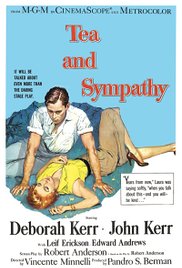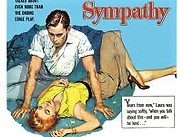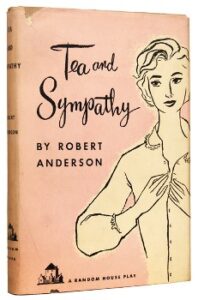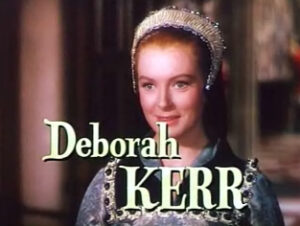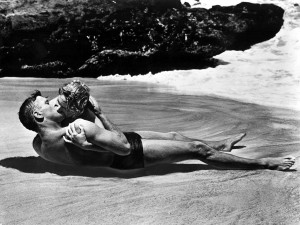Tea and Sympathy ** (1956, Deborah Kerr, John Kerr, Leif Erickson, Edward Andrews) – Classic Movie Review 4,964
The love that dared not speak its name is a bit of a problem with Vincente Minnelli’s well-meaning 1956 film version of Robert Anderson’s hit play. Because of the US censorship Code, the play’s subject of homosexuality is not mentioned in the film.
The love that dared not speak its name should have been the subject of the 1956 film Tea and Sympathy but MGM dared not speak its name. This is a bit of a problem with director Vincente Minnelli’s well-meaning 1956 film version of Robert Anderson’s 1953 hit Broadway play. Because of the Motion Picture Production Code, the play’s subject of homosexuality is not mentioned in the film version. Another problem is that the play’s star John Kerr, re-creating stage role for the movie, was now aged 25, playing a 17-year-old ‘schoolboy’ in the film.
So the story now is about the 17-year-old Tom Lee’s lack of interest in sports, mountain climbing and girls that gets him labelled ‘sister-boy’ at the New England boys’ prep school he is attending as a new senior. The boy is to take the part of a woman in the school play and his dad Herb (Edward Andrews) has a fit when he sees the frock!
The other boys accuse Tom of being ‘effeminate’ and persecute him after he sunbathes with a male professor, tormenting him for his ‘unmanly’ qualities and calling him ‘sister-boy’. Then, ah hem, things go badly when Tom is goaded into visiting the local prostitute, Ellie (Norma Crane), to dispel suspicions about his sexuality. On the plus side, Tom’s roommate Al (Darryl Hickman) treats him well, thinking being different is not the same as being unmasculine. And then it is up to a married woman to oppose the boys’ persecution of Tom and to pursue him romantically so he can prove he has a masculine character, offering him tea and sympathy.
Deborah Kerr (unrelated to John) also re-creates her stage role as Laura Reynolds, the love-starved wife of the school’s coach and dorm house head Bill Reynolds (Leif Erickson, from the Broadway production too). Laura befriends the sensitive, possibly gay adolescent Tom Lee (John Kerr) after she sees Tom’s suffering from his school mates and her husband, and tries to help him find himself, showing the boy straight love.
It is hard to have a lot of sympathy with the film but the Kerrs do very well under the circumstances, though time has clearly exposed this dated, insipid movie’s dishonesty. It lacks courage, grit and guts, all the things it most needs. Anderson’s play, one of the first to tackle the taboo topics of sexual orientation and homophobia, had been banned in Britain. The play was first performed in London at the Comedy Theatre (now the Harold Pinter Theatre) under membership conditions, because the Lord Chamberlain had imposed an outright ban. The film had a X certificate.
To be fair, the US censorship Hays Office forbade any hint of sexual deviancy in the movie so the screenwriters, for example, could not use the word ‘sissy’ in the screenplay and wrote out the implication that the school’s coach character was closeted or a latent homosexual like in the original play. They were forced to use the bizarre term ‘sister-boy’ instead.
So Tom is not gay. His classmates, father and others believe he is. But he is just not as macho or manly as they are or expect him to be.
Not surprisingly, the movie just does not work. It has its compensations, mostly in the performances of the Kerrs, but it just does not work. It could have been a pioneer. It could have been a contender. In another parallel universe, maybe.
Laura Reynolds famously says: ‘Years from now, when you talk about this – and you will – be kind.’ So, light years from 1956, should we be kind about the film?
Darryl Hickman, Norma Crane, Tom Laughlin, and Dean Jones have supporting roles.
Robert Anderson is also the film’s screenwriter.
The score is by Adolph Deutsch and the cinematography by John Alton.
It is produced by Pandro S Berman for MGM in Metrocolor. On a $1,737,000 budget, it earned $2,145,000 in north America and $1.3 million elsewhere, losing MGM $220,000.
Deborah Kerr defended it, saying: ‘I think Robert Anderson has done a fine job. The screenplay contains all the best elements of the play. After all, the play was about the persecution of a minority, wasn’t it? That still remains the theme of the film.’
The cast are Deborah Kerr as Laura Reynolds, John Kerr as Tom Robinson Lee, Leif Erickson as Bill Reynolds, Edward Andrews as Herb Lee, Darryl Hickman as Al, Norma Crane as Ellie Martin, Dean Jones as Ollie, Jacqueline deWit as Lilly Sears, Tom Laughlin as Ralph, Ralph Votrian as Steve, Steven Terrell as Phil, Kip King as Ted, Jimmy Hayes as Henry, Dick Tyler as Roger, and Don Burnett as Vic.
The play of Tea and Sympathy premiered on Broadway at the Ethel Barrymore Theatre on 30 September 1953, directed by Elia Kazan and starring Deborah Kerr, Leif Erickson and John Kerr. In summer 1954, Joan Fontaine and Anthony Perkins replaced Deborah Kerr and John Kerr. It closed on 18 June 1955 after 712 performances.
© Derek Winnert 2017 Classic Movie Review 4,964
Check out more reviews on http://derekwinnert.com

